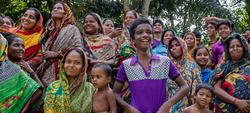United Nations | 23 February 2022
Development finance institutions must include in investments, ‘right to remedy’
The UN High Commissioner for Human Rights launched on Wednesday a ground-breaking new report for development finance institutions to ensure that the projects they support do not harm people, and make effective remedy is readily available.
The Remedy in Development Finance report gives guidance to development finance institutions to ensure that the projects they finance do not harm people, and that effective remedy is readily available for any potential victims.
While development finance institutions are not, and cannot be, responsible for all outcomes, Michelle Bachelet told the launch event in Washington DC that “in their own processes they are ideally placed to assess risk, exercise due diligence and plan for adverse outcomes”.
And while clients are responsible for project implementation, and States are the main authors and addressees of international human rights law, she reminded that “all are bound to respect human rights…should contribute in line with their own responsibilities, and…have roles to play in strengthening the remedy ecosystem”.
“Simply put: if you contribute to harm, you should contribute to remedy”, she stated.
Remedy ecosystem
While the daily work of development does not commonly involve violations of human rights, sometimes it does, including instances of forced evictions, child labour, and gender-based violence.
“Attacks on environmental and human rights defenders are increasing. Bad policies can erode economic and social rights. New threats, like digital technology risks, are emerging,” attested the UN human rights chief.
As development finance institutions and leading multilateral development banks have consistently set new global standards on sustainability and accountability, Ms. Bachelette told the participants that “their leadership, and the power of their example, are needed now, more than ever, on the issue of remedy” for “real results in people’s lives”.
‘Deeply personal’ connection
Remedying economic and social inequalities are “deeply personal” to the High Commissioner.
“In 1973, when I was 22, a military dictatorship seized power in my home country, Chile. My father was an Army General of real integrity: he was detained and tortured almost daily, for months. He died of his torture”, Ms. Bachelet told the gathering.
“My mother and I were also detained for a number of weeks, and many of our friends were abducted, disappeared, killed. In 1975, I was forced to leave my country and become a refugee”.
The High Commissioner continued to explain that at age 28 she was finally able to return to Chile, where she joined various organizations working to restore democracy.
‘Power of reparations’
“I committed myself to the reconciliation process, to fact-finding and truth telling, to expanding spaces of dialogue so that injustices could be acknowledged and addressed”, she said.
And as a physician, Ms. Bachelette worked with an organization that supported the social needs of children whose parents been victims of the dictatorship.
“This experience demonstrated not only the intergenerational impact of human rights abuses, but also the power of reparations, which have helped survivors, families and communities heal and become part of wider society, with dignity”, she explained.
Rural women form a large proportion of the agricultural labour force in Nepal.UN Women/Narendra Shrestha
Rural women form a large proportion of the agricultural labour force in Nepal.
Proactive remedies would help
The report upholds that more proactive, robust approaches to remedy would help development finance institutions avoid causing or contributing to human rights violations, minimize their reputational risks, and help them to meet changing public expectations and norms concerning responsible business practices.
Remedy in Development Finance also encourages the consistent and effective implementation of remedy, noting that reparations may include restitution, compensation, and guarantees of non-repetition – often most effective in combination.
Based on the UN Guiding Principles on Business and Human Rights, the report offers a framework to help development finance institution assess how and when they should contribute to remedy.












